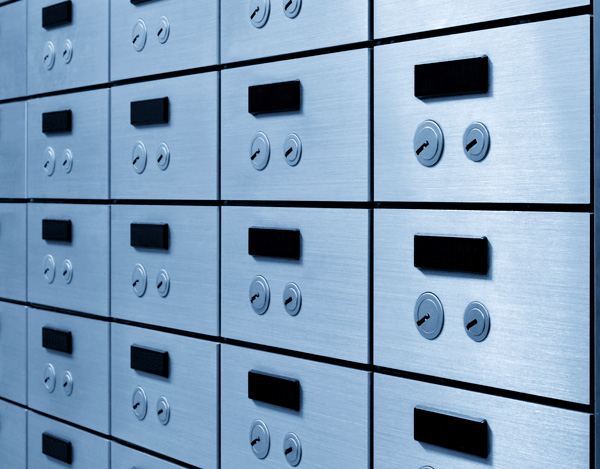
Safe deposit boxes are important features offered by many financial institutions (banks, credit unions, etc.) or other commercial establishments. Each year, millions of Americans rent safe deposit boxes. However, many consumers do not fully understand the scope of this service. This article will highlight the purpose of safe deposit boxes and what items should and should not be stored within them.
For many, a safe deposit box is a critical component of their family/household record system, and many equine business owners can take this advice and use it for business, too. According to Michigan State University Extension, safe deposit boxes offer private, convenient and low-cost offsite storage options for items that are difficult, costly or impossible to replace. They are potentially more resistant to theft and damage (i.e., fire or water) than home file cabinets or safes. Also, some insurance companies will offer lower insurance premiums on valuable items stored in safe deposit boxes versus storing them at home.
Items suitable for a safe deposit box include the following:
- Family records
- Marriage license
- Birth and death certificates
- Divorce papers
- Adoption papers
- Citizenship records
- Service/military records
- Other government or court ordered documents
- Original insurance policies
- Original deeds, titles or mortgages
- Leases or other contracts
- Stocks, bonds or certificates of deposit (CD’s)
- Patents
- Copyrights
- Automobile titles (if required in your state)
- Jewelry
- Medals
- Rare collections or collectibles
- Irreplaceable photo negatives
- Video or photos of your home’s contents
- A copy of your household and business inventories
Items that are not recommended for a safe deposit box are things that you might need in an emergency, such as: original “power of attorney” documents, passports, medical directives and funeral or burial instructions that you have prepared. You might consider giving your attorney the originals of the items mentioned above, then making copies that could either go into your safe deposit box or to a trusted friend or relative.
Accessibility and Safety
In deciding whether or not a safe deposit box is right for you, keep in mind there are other variables to consider. If you decide to pursue use of a safe deposit box, it is important to know who can access it and under what circumstances. Know the following:
- If you want a family member to be able to access your safe deposit box—such as a spouse or child—then you must jointly rent the box with that person. Being a joint renter means that every person entitled to accessing the box must sign the bank’s rental contract. However, it is important to note that in some states, co-renters might have difficulty accessing the box if the other co-renter dies.
- Just giving a key to someone does not give them the authority to access your safe deposit box.
- A Power of Attorney does not have the authority to access your box. You can appoint a “deputy” or “agent” who can have access to your box; however, this appointment must occur in the presence of a bank employee. The reason being a deputy or agent role, much like a Power of Attorney, can be granted or revoked at any time, and this role is automatically terminated if you die. So, appointing a deputy or agent in the presence of bank employee offers proof that this decision is current and valid.
- If law enforcement suspects that you are hiding something illegal in your box they can contact the appropriate court and obtain a court order to access your box and seize the contents. If there are non-criminal issues suspected, then the IRS can freeze your assets until the dispute is resolved (an example would be if a business claims that you owe them money).
- If your safe deposit box is abandoned as determined by state law (i.e., the rental fee is no longer being paid) and efforts to reach you are unsuccessful, then the contents will be submitted to the state’s unclaimed property office.
- In the event a bank closes, the FDIC usually tries to find another financial institution to take it over. However, if unsuccessful, then the FDIC will contact you to remove your items from your safe deposit box.
How Safe are Safe Deposit Boxes?
The FDIC highlights the following:
- Safe deposit boxes and the vaults that hold them are made to be resistant to fire, flood, heat, earthquakes and explosions. It is important to remember that they are “resistant” to these events, and there are no guarantees against damage from these events.
- Keep in mind that anything stored in a safe deposit box is not insured by the FDIC. The FDIC only insures deposits made into deposit accounts at insured institutions.
- If you are interested in insuring the contents of your safe deposit box, consult with your insurance agent or financial institution to see if they offer this extra coverage. It is recommended that you shop around and compare prices for this kind of extra coverage.
- Lastly, while it does not occur often, safe deposit boxes can be robbed by thieves. Safe deposit boxes are stored in concrete or steel vaults and are equipped with extensive security systems.
If you would like additional information on safe deposit box safety, visit the FDIC.
Find more educational articles at Michigan State University Extension.


